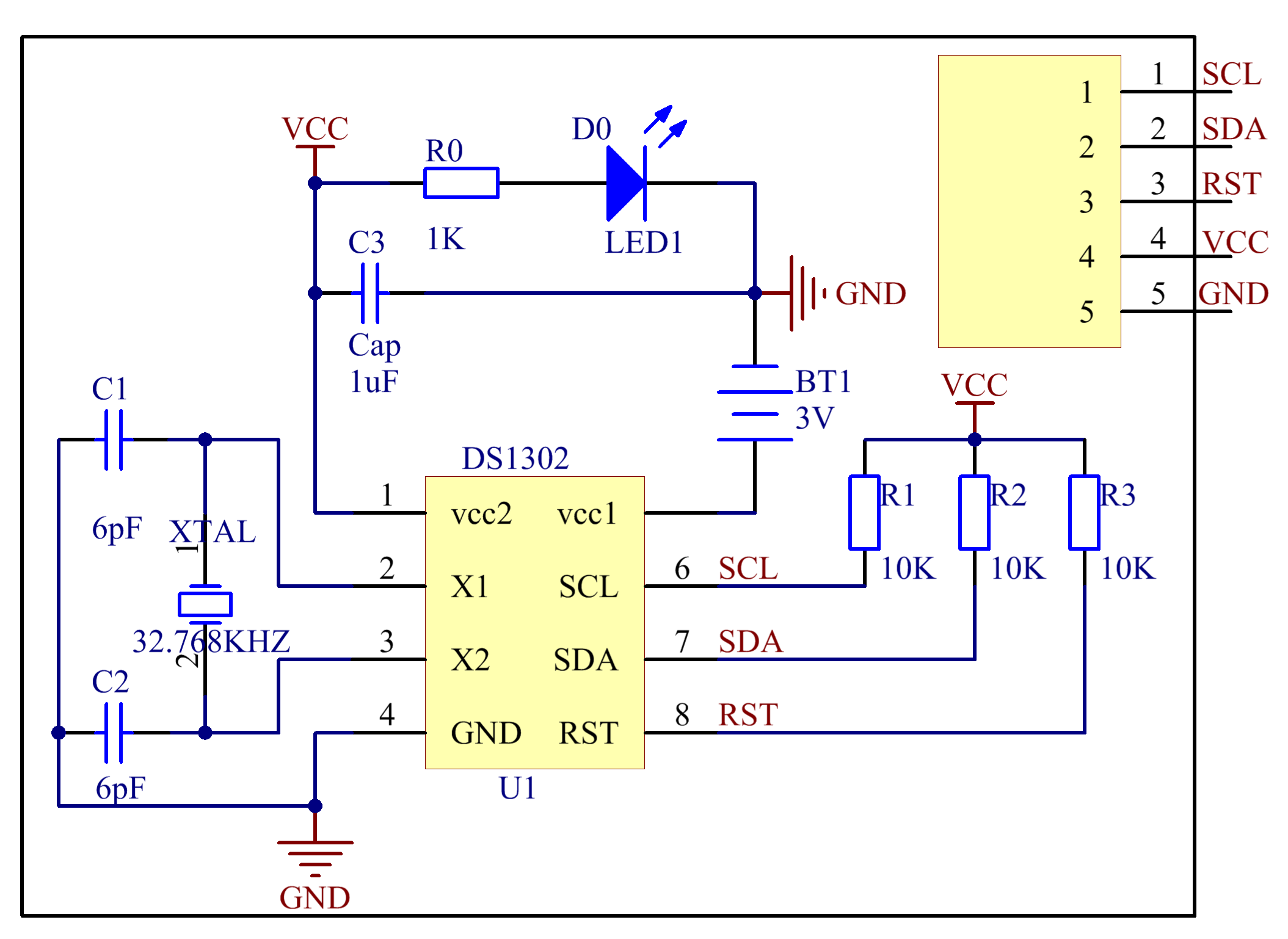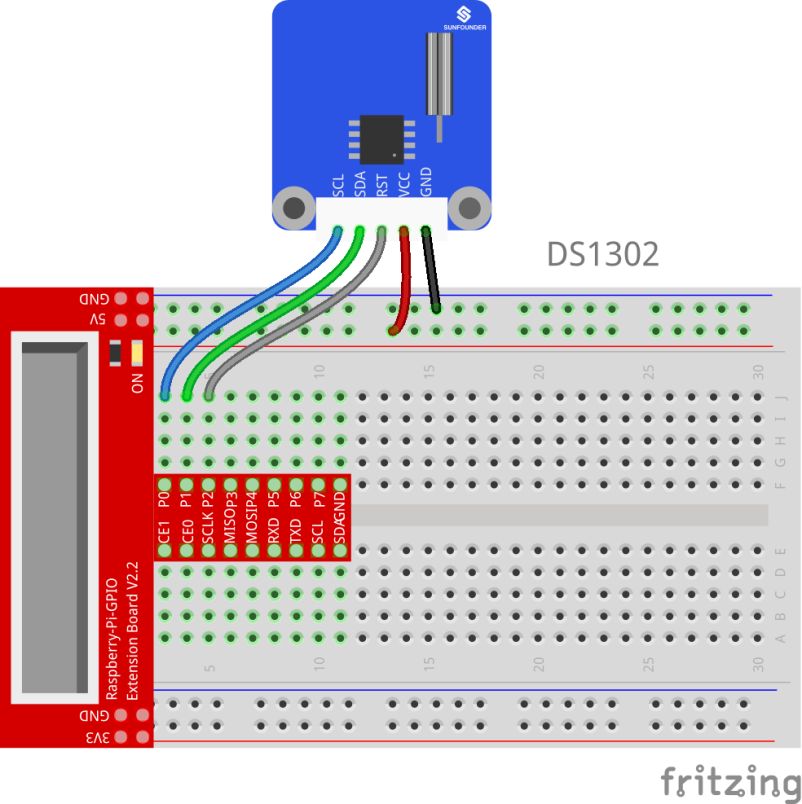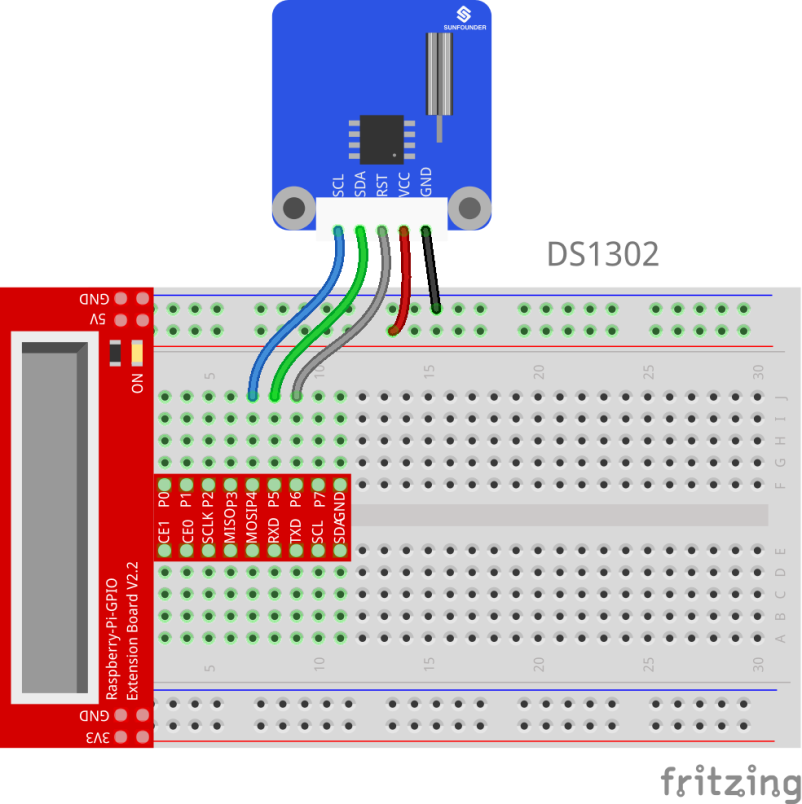Introduction
DS1302 is a trickle charging clock chip, launched by DALLAS in America. With a built-in real-time clock/calendar and a 31-byte static RAM, it can communicate with MCU through simple serial interfaces. The real-time clock/calendar circuit provides information about second, minute, hour, day, week, month, and year. DS1302 can automatically adjust the number of days per month and days in leap year. You can determine to use a 24-hour or 12-hour system by AM/PM selection.

Components
– 1 * Raspberry Pi
– 1 * Breadboard
– 1 * Network cable (or USB wireless network adapter)
– 1 * DS1302 RTC module
– 1 * 5-Pin anti-reverse cable
Experimental Principle
Interfacing the DS1302 with a microprocessor is simplified by using synchronous serial communication. Only three wires are required to communicate with the clock/RAM: RST, serial data (SDA) and serial clock (SCL). SDA can be transferred to and from the clock/RAM one byte at a time or in a burst of up to 31 bytes.
After the time of the DS1302 is set manually, the MCU starts to read the accurate time and date returned by DS1302.
The schematic diagram:

Experimental Procedures
For C language users:
Step 1: Build the circuit
| Raspberry Pi | RTC DS1302 Module |
| GPIO0 | SCL |
| GPIO1 | SDA |
| GPIO2 | RST |
| 5V | VCC |
| GND | GND |

Step 2: Change directory
cd /home/pi/SunFounder_SensorKit_for_RPi2/C/33_ds1302/
Step 3: Compile:
gcc gcc rtc_ds1302.c -lwiringPi -lwiringPiDev
Step 4: Set up time by:
sudo ./a.out –sdsc
Set year, month, date as YYMMDD
Set hour, minute, second as HHMMSS(24-hour clock)
Set weekday (0 as Sunday)
Step 5: Run:
sudo sudo ./a.out
For Python users:
Step 1: Build the circuit
| Raspberry Pi | RTC DS1302 Module |
| GPIO4 | SCL |
| GPIO5 | SDA |
| GPIO6 | RST |
| 5V | VCC |
| GND | GND |

Step 2: Change directory
cd /home/pi/SunFounder_SensorKit_for_RPi2/Python/
Step 3: Run
sudo python 33_ds1302.py
Now you can see the time on the screen.

For C language

For Python
C Code
#include <stdio.h>
#include <stdlib.h>
#include <stdint.h>
#include <string.h>
#include <time.h>
#include <wiringPi.h>
#include <ds1302.h>
// Register defines
#define RTC_SECS 0
#define RTC_MINS 1
#define RTC_HOURS 2
#define RTC_DATE 3
#define RTC_MONTH 4
#define RTC_DAY 5
#define RTC_YEAR 6
#define RTC_WP 7
#define RTC_TC 8
#define RTC_BM 31
static unsigned int masks [] = { 0x7F, 0x7F, 0x3F, 0x3F, 0x1F, 0x07, 0xFF } ;
// bcdToD: dToBCD:
static int bcdToD (unsigned int byte, unsigned int mask)
{
unsigned int b1, b2 ;
byte &= mask ;
b1 = byte & 0x0F ;
b2 = ((byte >> 4) & 0x0F) * 10 ;
return b1 + b2 ;
}
static unsigned int dToBcd (unsigned int byte)
{
return ((byte / 10) << 4) + (byte % 10) ;
}
// ramTest:
static int ramTestValues [] =
{ 0x00, 0xFF, 0xAA, 0x55, 0x01, 0x02, 0x04, 0x08, 0x10, 0x20, 0x40, 0x80, 0x00, 0xF0, 0x0F, -1 } ;
static int ramTest (void)
{
int addr ;
int got ;
int i = 0 ;
int errors = 0 ;
int testVal ;
printf ("DS1302 RAM TEST\n") ;
testVal = ramTestValues [i] ;
while (testVal != -1)
{
for (addr = 0 ; addr < 31 ; ++addr)
ds1302ramWrite (addr, testVal) ;
for (addr = 0 ; addr < 31 ; ++addr)
if ((got = ds1302ramRead (addr)) != testVal)
{
printf ("DS1302 RAM Failure: Address: %2d, Expected: 0x%02X, Got: 0x%02X\n",
addr, testVal, got) ;
++errors ;
}
testVal = ramTestValues [++i] ;
}
for (addr = 0 ; addr < 31 ; ++addr)
ds1302ramWrite (addr, addr) ;
for (addr = 0 ; addr < 31 ; ++addr)
if ((got = ds1302ramRead (addr)) != addr)
{
printf ("DS1302 RAM Failure: Address: %2d, Expected: 0x%02X, Got: 0x%02X\n",
addr, addr, got) ;
++errors ;
}
if (errors == 0)
printf ("-- DS1302 RAM TEST: OK\n") ;
else
printf ("-- DS1302 RAM TEST FAILURE. %d errors.\n", errors) ;
return 0 ;
}
// setLinuxClock:
static int setLinuxClock (void)
{
char dateTime [20] ;
char command [64] ;
int clock [8] ;
printf ("Setting the Linux Clock from the DS1302... ") ; fflush (stdout) ;
ds1302clockRead (clock) ;
// [MMDDhhmm[[CC]YY][.ss]]
sprintf (dateTime, "%02d%02d%02d%02d%02d%02d.%02d",
bcdToD (clock [RTC_MONTH], masks [RTC_MONTH]),
bcdToD (clock [RTC_DATE], masks [RTC_DATE]),
bcdToD (clock [RTC_HOURS], masks [RTC_HOURS]),
bcdToD (clock [RTC_MINS], masks [RTC_MINS]),
20,
bcdToD (clock [RTC_YEAR], masks [RTC_YEAR]),
bcdToD (clock [RTC_SECS], masks [RTC_SECS])) ;
sprintf (command, "/bin/date %s", dateTime) ;
system (command) ;
return 0 ;
}
// setDSclock:
static int setDSclock (void)
{
struct tm t ;
time_t now ;
int clock [8] ;
int time = 0 ;
int date = 0 ;
int weekday = 0 ;
printf ("Setting the clock in the DS1302 from type in... ") ;
printf ("\n\nEnter Date(YYMMDD): ") ;
scanf ("%d", &date) ;
printf ("Enter time(HHMMSS, 24-hour clock): ") ;
scanf ("%d", &time) ;
printf ("Enter Weekday(0 as sunday): ") ;
scanf ("%d", &weekday) ;
// printf("\ndate: %d, time: %d\n\n", date, time) ;
clock [ 0] = dToBcd (time % 100) ; // seconds
clock [ 1] = dToBcd (time / 100 % 100) ; // mins
clock [ 2] = dToBcd (time / 100 / 100) ; // hours
clock [ 3] = dToBcd (date % 100) ; // date
clock [ 4] = dToBcd (date / 100 % 100) ; // months 0-11 --> 1-12
clock [ 5] = dToBcd (weekday) ; // weekdays (sun 0)
clock [ 6] = dToBcd (date / 100 / 100) ; // years
clock [ 7] = 0 ; // W-Protect off
ds1302clockWrite (clock) ;
printf ("OK\n") ;
return 0 ;
}
int main (int argc, char *argv [])
{
int i ;
int clock [8] ;
int year ;
int month ;
int date ;
int hour ;
int minute ;
int second ;
int weekday ;
wiringPiSetup () ;
ds1302setup (0, 1, 2) ;
if (argc == 2)
{
/**/ if (strcmp (argv [1], "-slc") == 0)
return setLinuxClock () ;
else if (strcmp (argv [1], "-sdsc") == 0)
return setDSclock () ;
else if (strcmp (argv [1], "-rtest") == 0)
return ramTest () ;
else
{
printf ("Usage: ds1302 [-slc | -sdsc | -rtest]\n") ;
return EXIT_FAILURE ;
}
}
for (i = 0 ;; ++i)
{
printf ("%5d: ", i) ;
ds1302clockRead (clock) ;
hour = bcdToD (clock [2], masks [2]) ;
minute = bcdToD (clock [1], masks [1]) ;
second = bcdToD (clock [0], masks [0]) ;
date = bcdToD (clock [3], masks [3]) ;
month = bcdToD (clock [4], masks [4]) ;
year = bcdToD (clock [6], masks [6]) + 2000 ;
weekday = bcdToD (clock [5], masks [5]) ;
printf (" %04d-%02d-%02d", year, month, date) ;
printf (" %02d:%02d:%02d", hour, minute, second) ;
switch (weekday){
case 0: printf (" SUN") ; break;
case 1: printf (" MON") ; break;
case 2: printf (" TUE") ; break;
case 3: printf (" WED") ; break;
case 4: printf (" THU") ; break;
case 5: printf (" FRI") ; break;
case 6: printf (" SAT") ; break;
}
printf ("\n") ;
delay (200) ;
}
return 0 ;
}
Python Code
#!/usr/bin/env python
#-----------------------------------------------------
#
# This is a program for DS1302 RTC Module.
# It provide precision timmer.
#
# This program depend on rpi_time.py.
#
# ds1302 Module Pi
# VCC ------------------ 5 V (Must be 5v)
# GND ------------------ GND
# SCL ---------------- Pin 16
# SDA ---------------- Pin 18
# RST ---------------- Pin 22
#
#-----------------------------------------------------
from datetime import datetime
import ds1302
import rpi_time
import time
rtc = rpi_time.DS1302()
def setup():
print ''
print ''
print rtc.get_datetime()
print ''
print ''
a = raw_input( "Do you want to setup date and time?(y/n) ")
if a == 'y' or a == 'Y':
date = raw_input("Input date:(YYYY MM DD) ")
time = raw_input("Input time:(HH MM SS) ")
date = date.split()
time = time.split()
print ''
print ''
ds1302.set_date(int(date[0]), int(date[1]), int(date[2]))
ds1302.set_time(int(time[0]), int(time[1]), int(time[2]))
dt = rtc.get_datetime()
print "You set the date and time to:", dt
def loop():
while True:
a = rtc.get_datetime()
print a
time.sleep(0.5)
def destory():
GPIO.cleanup() # Release resource
if __name__ == '__main__': # Program start from here
setup()
try:
loop()
except KeyboardInterrupt: # When 'Ctrl+C' is pressed, the child program destroy() will be executed.
destory()